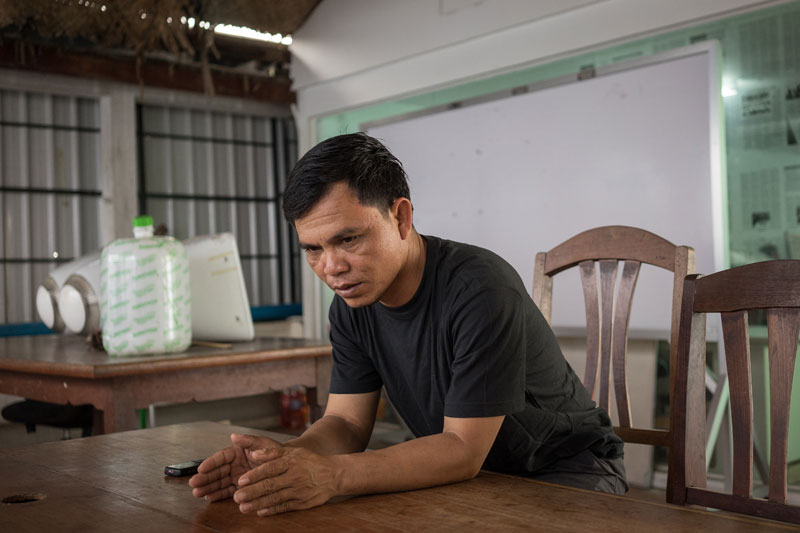As police closed in on Montagnard asylum seekers hiding in the forests of Ratanakkiri province last week, Klan Hoeun, 42, said Wednesday that he knew he had to at least try to get the group to Phnom Penh, to safety.
“I needed to help them,” the Cambodian Jarai villager said during an interview in Phnom Penh.

“During the Pol Pot regime, I fled to Vietnam and the Montagnards helped us, provided food to us and convinced the government to help us,” he added.
After weeks of hiding out in small groups in the northern province, time was running out for 49 Montagnard asylum seekers who had fled into Cambodia from their homes in Vietnam.
Another ethnic Jarai villager, who aided the Montagnards after their arrival, said their situation had grown increasingly dire in recent weeks.
Food was running short, several were becoming dangerously ill and a nearby forest fire was making it even more difficult for them to evade police, said the villager, who requested anonymity for fear of reprisals.
“We were worried authorities would find those people soon, because there was no more forest for them to hide in because much of it had been burned,” he said on Monday.
Since the Montagnards—an indigenous group from Vietnam’s Central Highlands—began crossing the border in October, fleeing religious and political persecution by Hanoi, local authorities have repeatedly threatened them with arrest and deportation.
Out of desperation, the Montagnards and their Jarai minders decided that 36 of the group would take their chances and head to Phnom Penh. Once in the capital, they hoped the U.N. would help them apply for asylum at the Interior Ministry’s refugee department.
So at 9 p.m. on February 26, Mr. Hoeun, using two hired vans and drivers, began picking up the asylum seekers from their hiding places in separate locations in O’Yadaw, Bakeo and Lumphat districts.
With the 36 Montagnards in tow, he directed the drivers to head west through Kon Mom district.
Shortly after crossing into Kon Mom, traffic police at the O’Cheng checkpoint pulled the vans over.
“Police asked the drivers what we were transporting and the drivers said we were just transporting workers back to their homes,” Mr. Hoeun said. “Then they just let us go.”
But they didn’t make it far down the road. At about 1 a.m. on Friday, traffic police again stopped the vans, this time escorting them to the Vietnamese border.
“Police stopped the car again and arrested us,” Mr. Hoeun said. “The Montagnards were afraid, but we didn’t know what to do.”
After traveling some 100 km to the O’Yadaw border checkpoint, Mr. Hoeun said, police ordered him and the Montagnards to get out of the vans and walk through the checkpoint into Duc Co district of Vietnam’s Gia Lai province.
On Monday, provincial police chief Nguon Koeun denied the arrests ever took place.
Asked about the arrests Wednesday, Ratanakkiri provincial governor Thorn Savun threatened to file a complaint against a reporter.
“You should not act like a stupid man,” Mr. Savun said. “I need your name, ID card and personal telephone number…because I want to file a complaint against you for interrupting my private work and my rest time.”
Mr. Hoeun said he did not tell police that he was a Cambodian citizen because they did not ask.
“But I was afraid for my life” in Vietnam, he added.
Mr. Hoeun, who speaks fluent Vietnamese, said Vietnamese police then transferred the group to the Duc Co police station.
“They asked me why I got in a car with the Montagnards. I just told them I did not know the car had Montagnards in it,” he said.
Police then questioned each Montagnard individually.
“They didn’t hit them,” Mr. Hoeun said. “When we were detained at the police station we even ate instant noodles with the police.”
Yet after questioning, police herded the Montagnards into separate vehicles and drove off. Mr. Hoeun said he did not see them again.
He was placed in a cell in the Gia Lai provincial police station while police decided what to do with him.
“I stayed there for two nights, then they sent me to Saigon.”
Once in the city, Mr. Hoeun said he was held in another prison, where he spent two more nights, before being escorted to the Bavet border checkpoint and handed to Cambodian police Tuesday afternoon.
“Police asked me where I was coming from and I said, ‘I came from Vietnam after I was mistakenly arrested with Montagnards,’” he said, adding that the officers allowed him to use a telephone to call his wife and two children.
Mr. Hoeun said the police then put him on a Phnom Penh-bound tourist bus.
According to Chhay Thy, Ratanakkiri provincial coordinator for rights group Adhoc, there are currently 13 Montagnards still hiding in O’Yadaw district.
Mr. Thy said Wedmesday that he believed Vietnamese police were involved in the arrest of the Montagnards.
“I will investigate to find the truth,” he said Wednesday.
As for Mr. Hoeun, he said he had not yet decided when to return home, but was concerned that provincial authorities might target him if he does so.
“However, I will keep helping the Montagnards if it is possible for me to do it,” he said.